As Trump threatens BRICS, it grows stronger, resisting US dollar and Western imperialism
Donald Trump threatened tariffs on BRICS, claiming the group is "dead", but it is growing. 10 members and 10 partners participated in a summit in Brazil, discussing dedollarization and decolonization.
The Global South-led organization BRICS has been growing in size and influence, and this has frightened some Western politicians.
Donald Trump is particularly rattled. After he returned to the White House for his second term as US president, Trump threatened very high tariffs on BRICS, and falsely said he had destroyed the organization.
“BRICS is dead”, Trump claimed in a press conference on 13 February. The US president stated:
BRICS was put there for a bad purpose, and most of those people don't want — they don't even want to talk about it now; they're afraid to talk about it.
Because I told them, if they want to play games with the dollar, then they're going to be hit with a 100% tariff, the day they mention that they want to do it. And they will come back and say, “We beg you, we beg you not to do this”.
BRICS is dead, since I mentioned that. BRICS died the minute I mentioned that.
And I know, I remember when Obama and Biden in particular, I guess he said that, “Oh, they have us over a barrel”. They don't have us over a barrel; we have them over a barrel.
If BRICS wants to play games, those countries won't trade with us; we won't trade with them. And if any trading gets through, it'll be a 100% tariff, at least.
Trump’s claim that “BRICS is dead” could not be further from the truth. The exact opposite is happening: BRICS is continuously expanding.
2025 BRICS summit in Río de Janeiro, Brazil
In July, representatives of BRICS countries gathered in Brazil for an annual summit. This was the first meeting that featured the 10 partner countries that were added to BRICS in 2025, in addition to the new members that were admitted in 2024.
BRICS now consists of 20 countries.
The 10 BRICS members are the founding five — Brazil, Russia, India, China, and South Africa — plus Egypt, Ethiopia, Indonesia, Iran, and the United Arab Emirates.
The 10 BRICS partners are Belarus, Bolivia, Cuba, Kazakhstan, Malaysia, Nigeria, Thailand, Uganda, Uzbekistan, and Vietnam.
The 2025 BRICS summit in Río de Janeiro was historic, because it included for the first time the participation of Vietnam, which had been admitted to the group in June.
Geopolitical Economy Report previously detailed how the US government has tried to divide China and Vietnam, in an unsuccessful attempt to recruit Hanoi for Washington’s Cold War Two against Beijing.
Vietnam’s decision to join BRICS was a clear sign that its foreign policy remains independent and non-aligned.
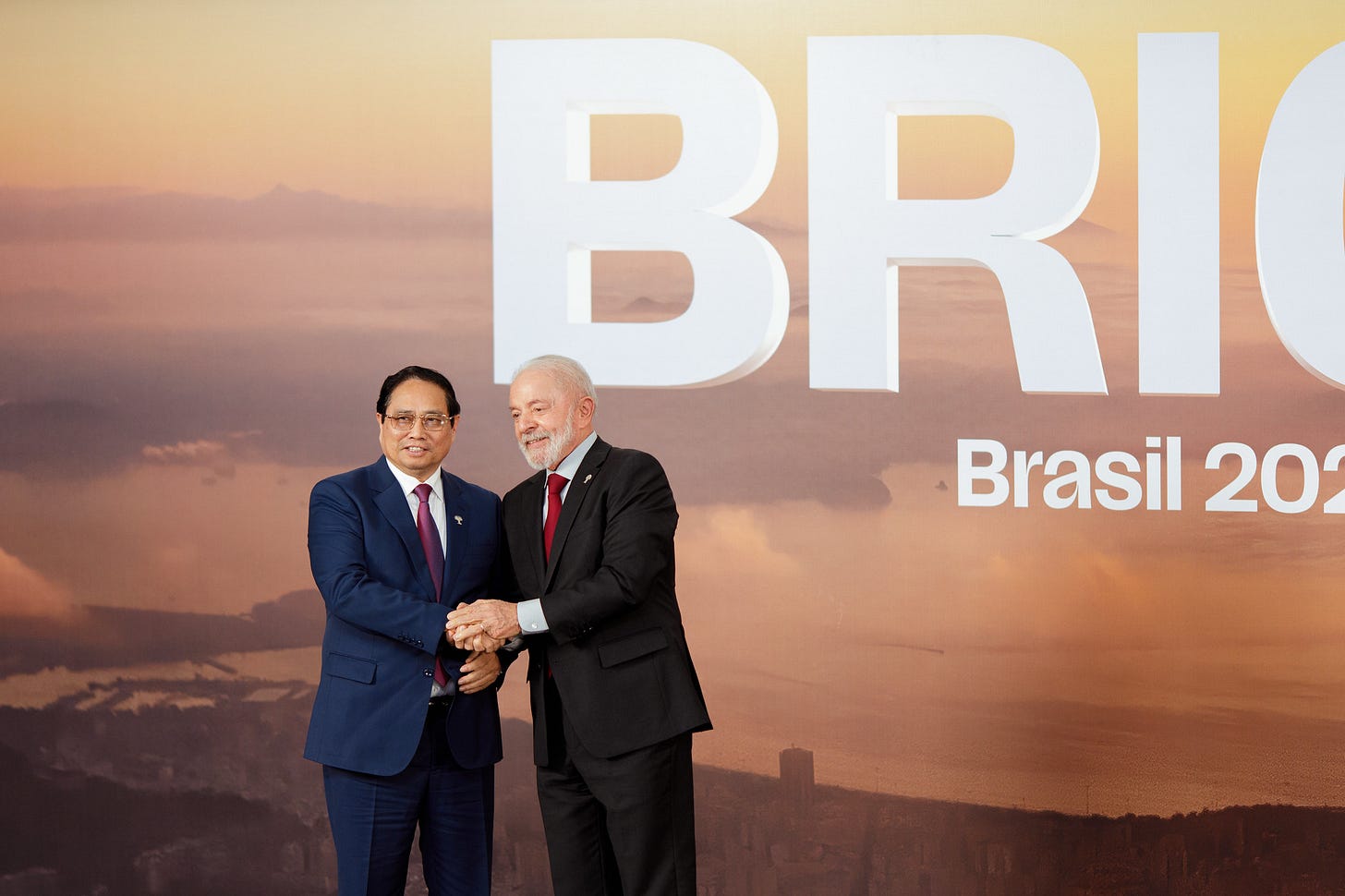
Moreover, on the sidelines of the BRICS summit in Brazil, Reuters reported that Vietnam’s Prime Minister Pham Minh Chinh and China’s Premier Li Qiang held a friendly meeting, and “agreed to boost trade and investment ties”.
The 2025 BRICS summit also featured the participation of Cuba’s President Miguel Díaz-Canel.
This was symbolic, given that Cuba has suffered under illegal US sanctions and a devastating blockade for more than 60 years, despite the fact that, every year the United Nations General Assembly, nearly every country on Earth votes to demand an end to the criminal US embargo.
The vision that BRICS has for a more multipolar world, where the Global South is equal and the colonialist nations of the Global North no longer have an unfair “exorbitant privilege”, is very attractive to most countries on Earth.
Even the United States’ top trading partner and southern neighbor, Mexico, participated in the BRICS summit in Río de Janeiro.
Mexico’s progressive President Claudia Sheinbaum sent Foreign Secretary Juan Ramón de la Fuente to Brazil to participate, even though Mexico is not officially a member or partner of BRICS.
The Mexican government announced that it had been invited to serve as an “observer” by Brazil, which holds the annual rotating BRICS presidency for 2025.
Trump threatens more tariffs on BRICS countries
The US president clearly was unsettled by the BRICS summit held in Brazil on 6 July, because on that day he took to his website Truth Social to threaten the organization.
“Any Country aligning themselves with the Anti-American policies of BRICS, will be charged an ADDITIONAL 10% Tariff”, Trump wrote.
“There will be no exceptions to this policy”, he added.
This 10% tariff threat was a significant reduction of the 100% duty that Trump had originally vowed to impose on BRICS countries.
Brazil’s President Lula da Silva shot back at Trump’s threats, implying that the US president was trying to become a global “emperor”.
“The world has changed. We don't want an emperor”, Lula said.
“This is a set of countries that wants to find another way of organizing the world from the economic perspective”, Lula added. “I think that's why the BRICS are making people uncomfortable”.
Trump falsely claimed that Spain is part of BRICS
Nevertheless, it should be underscored that Trump doesn't really understand what BRICS is.
In a White House press conference in January, Trump again threatened BRICS, and he falsely claimed that Spain is part of the Global South-led organization. The European nation is not involved, and never has been.
Trump said:
They’re a BRICS nation, Spain. You know what a BRICS nation is? You'll figure it out. But — and if the BRICS nations want to do that, that's okay, but we're going to put at least a 100% tariff on the business they do with the United States.
You know what the BRICS is, right? You guys know, you know what I'm saying, you know what I'm saying.
BRICS: 44% of global GDP (PPP), 56% of world population
The US government’s fear of BRICS is rooted in the Global South-led organization’s increasing power.
The 20 BRICS members and partners already make up more than two-fifths of the global economy: 43.93% of world GDP, when measured at purchasing power parity (PPP).
The BRICS 20 also have a combined population of 4.45 billion, meaning they represent 55.61% of the global population — the majority of the world.
BRICS discusses dedollarization
One of the key issues discussed at the 2025 BRICS summit was dedollarization — the attempt to create alternatives to the US dollar as the global reserve currency.
Brazil’s left-wing President Lula da Silva has long been an advocate of dedollarization.
“The world needs to find a way that our trade relations don't have to pass through the dollar”, Lula said at the BRICS summit.
“Obviously, we have to be responsible about doing that carefully. Our central banks have to discuss it with central banks from other countries”, the Brazilian leader explained, according to Reuters. He added, “That's something that happens gradually until it's consolidated”.
Lula qualified that dedollarization is “complicated” and will be a slow, gradual process, but he maintained that it is necessary.
At the 2025 BRICS summit, the Brazilian president even reiterated his call for the creation of a new global currency to challenge the US dollar.
“That’s why your debate about the need for a new trade currency is so important. Is it complicated? I know. There are political challenges. But if we don’t find a new formula, we’ll end the 21st century the same way we started the 20th. And that won’t benefit humanity”, Lula said.
BRICS initiatives to advance dedollarization
At the summit on 6 July, 2025, the 20 BRICS members and partners signed a lengthy joint statement. The Rio de Janeiro Declaration was 31 pages long, and consisted of 126 points, encompassing a wide variety of subjects.
The joint declaration made many references to BRICS initiatives to encourage dedollarization.
It called to strengthen the BRICS bank, the New Development Bank (NDB), to “support its growing role as a robust and strategic agent of development and modernization in the Global South”.
In particular, the document emphasized the need for the NDB to “expand local currency financing”.
The BRICS declaration similarly urged further development of the Contingent Reserve Arrangement (CRA), which could serve as an alternative to the US-dominated International Monetary Fund (IMF), by providing short-term liquidity to countries facing balance-of-payments crises.
Another initiative discussed in the document was the New Investment Platform (NIP), which seeks to facilitate investments in local currencies, instead of US dollars, British pounds, or euro.
The declaration addressed the BRICS Interbank Cooperation Mechanism (ICM), which is working on “finding acceptable mechanisms of financing in local currencies”.
The joint statement also highlighted the work of the BRICS Cross-Border Payments Initiative and BRICS Payment Task Force (BPTF), which it noted are identifying “the potential for greater interoperability of BRICS payment systems”, as part of “efforts to facilitate fast, low-cost, more accessible, efficient, transparent, and safe cross-border payments among BRICS countries and other nations and which can support greater trade and investment flows”.
BRICS New Development Bank expands
The current chief of the BRICS bank is Dilma Rousseff, the former president of Brazil, from Lula’s left-wing Workers’ Party.
She announced that two more countries had joined the New Development Bank: Colombia and Uzbekistan.
Colombia’s accession was especially symbolic, given that the South American nation has historically been one of the closest allies of the United States.
Under its first ever left-wing president, Gustavo Petro, Colombia has adopted a more non-aligned foreign policy, and has expressed support for BRICS.
Just a few days before the BRICS summit, leaked audio recordings exposed the US government’s links to a coup attempt against Colombia’s democratically elected left-wing leader.
With the addition of Colombia and Uzbekistan, the New Development Bank now has 11 members, including the founding five of Brazil, Russia, India, China, and South Africa, plus the United Arab Emirates, Bangladesh, Egypt, and Algeria.
BRICS promotes trade, investment, and lending in local currencies
In her remarks at the BRICS summit, Dilma emphasized that the New Development Bank is promoting financing in local currencies.
“Any business or government that borrows in foreign currency becomes subject to decisions made by the Federal Reserve or other central banks in developed nations”, she said, warning of exchange-rate risk and currency volatility.
As a positive example of an alternative, the BRICS website noted that Dilma “pointed to a project in Brasil funded directly in renminbi, without the need for dollar conversion”.
The official BRICS readout of Dilma’s speech emphasized that “local-currency operations will remain an absolute priority as a means of building a more diverse, balanced international financial system”.
Dedollarization will be slow and steady, the NDB president stressed. The role of the US dollar as the global reserve currency will not end overnight, “But the rise of initiatives to expand trade in local currencies is undeniable, and I see that as a positive development”, Dilma explained.
BRICS follows in footsteps of Non-Aligned Movement and Bandung Conference
In speeches they delivered at the 2025 summit, several Global South leaders emphasized that they see BRICS as following in the footsteps of the Non-Aligned Movement and the anti-colonial Bandung Conference of 1955.
Brazil’s President Lula declared that “BRICS is an indispensable actor in the struggle for a multipolar, less asymmetrical, and more peaceful world”.
He lamented that the US-dominated international financial system benefits the rich colonial countries at the expense of the poor, formerly colonized ones.
Lula stated (emphasis added):
The frameworks of the World Bank and the IMF currently support a "reverse Marshall Plan," where emerging and developing economies essentially finance the more developed world.
International aid flows have decreased, and debt costs for the poorest countries have soared. The neoliberal model only deepens inequalities.
For instance, 3000 billionaires have collectively earned USD 6.5 trillion since 2015.
Tax justice and the fight against tax evasion are essential to truly consolidate inclusive and sustainable growth strategies fit for the 21st century.
In another speech at the BRICS summit, the Brazilian president said the following (emphasis added):
The United Nations recently marked its 80th anniversary on June 26 of this year, and we are witnessing an unprecedented collapse of multilateralism.
The advent of the UN marked the defeat of Nazi-Fascism and the birth of a sense of collective hope.
The vast majority of countries that currently comprise the BRICS were among its founders.
Ten years later, the Bandung Conference refuted the division of the world into zones of influence and advanced the fight for a multipolar international order.
BRICS is an heir of the Non-Aligned Movement.
With multilateralism under attack, our autonomy is once again in check.
…
International law has become a dead letter, as has the pacific resolution of controversies.
We are before an unprecedented number of conflicts since World War II.
NATO’s recent decision feeds the arms race.
It is easier to designate 5% of the GDP to military spending than to allocate the 0.7% that has been promised for Official Development Assistance.
Lula condemned the “genocidal practices by Israel in Gaza, the indiscriminate killing of innocent civilians, and the use of starvation as a weapon of war”.
The Brazilian government demanded an “end of the Israeli occupation and the establishment of a sovereign Palestinian State”.
Lula also “denounced the violations of Iran's territorial integrity” by the United States and Israel.
Lamenting the “loss of credibility and paralysis” in the UN Security Council, due to Washington’s abuse of its veto power, Brazil reiterated its call for “deep transformations in the Security Council”, with the inclusion of “new permanent members from Asia, Africa, Latin America, and the Caribbean”.
Malaysia’s Prime Minister Anwar Ibrahim also delivered a powerful speech likening BRICS to the Non-Aligned Movement and Bandung Conference.
Anwar stated (emphasis added):
It is a historic moment for those of you who have been following the antecedents of history, who realize the attempt to save the voice of newly emerging economies and countries post colonialism was by Sukarno of Indonesia, Zhou Enlai of China, Jawaharlal Nehru of India, Kwame Nkrumah of Africa.
It was a bold attempt to ensure that the voice of conscience, those struggling for freedom and justice is heard. Not much success. It was a bold attempt.
Then we have a Non-aligned Movement, proceeding that. Then we have G77, still not achieving the desired results.
Now, I salute you, President Lula, for having the courage to proceed with a clear vision, a clear commitment to voice the concerns, aspirations of the people, particularly of the Global South.
…
We have enormous potential to increase because only with that strength can we safely, fairly, justly negotiate with all other partners multilaterally.
We must demand a change. Democratic, just international and multilateral organization from the United Nations to WTO to IMF in the World Bank
…
We have attempted in ASEAN other than enhancing international trade is even using financial settlement systems. We use our local currency. Of course, we’re not talking about de-dollarization because there’s a long way to go, but at least we try, Malaysia with Indonesia, Malaysia with Thailand, and together with China, trying to use our own local currency, even beginning with 10 or 20%, it makes a difference, because we cannot continue complaining but not executing our own plan among in our countries and our friendly neighbors.
…
But I come back to the major and central issue: BRICS today of 2025 is not the first attempt.
The Bandung Conference of 1955 — at that time we were struggling, No industry, no new technology, no competence except for a united nation, the country, and political leadership.
Now we have political leadership with that vision and we have strong business community.



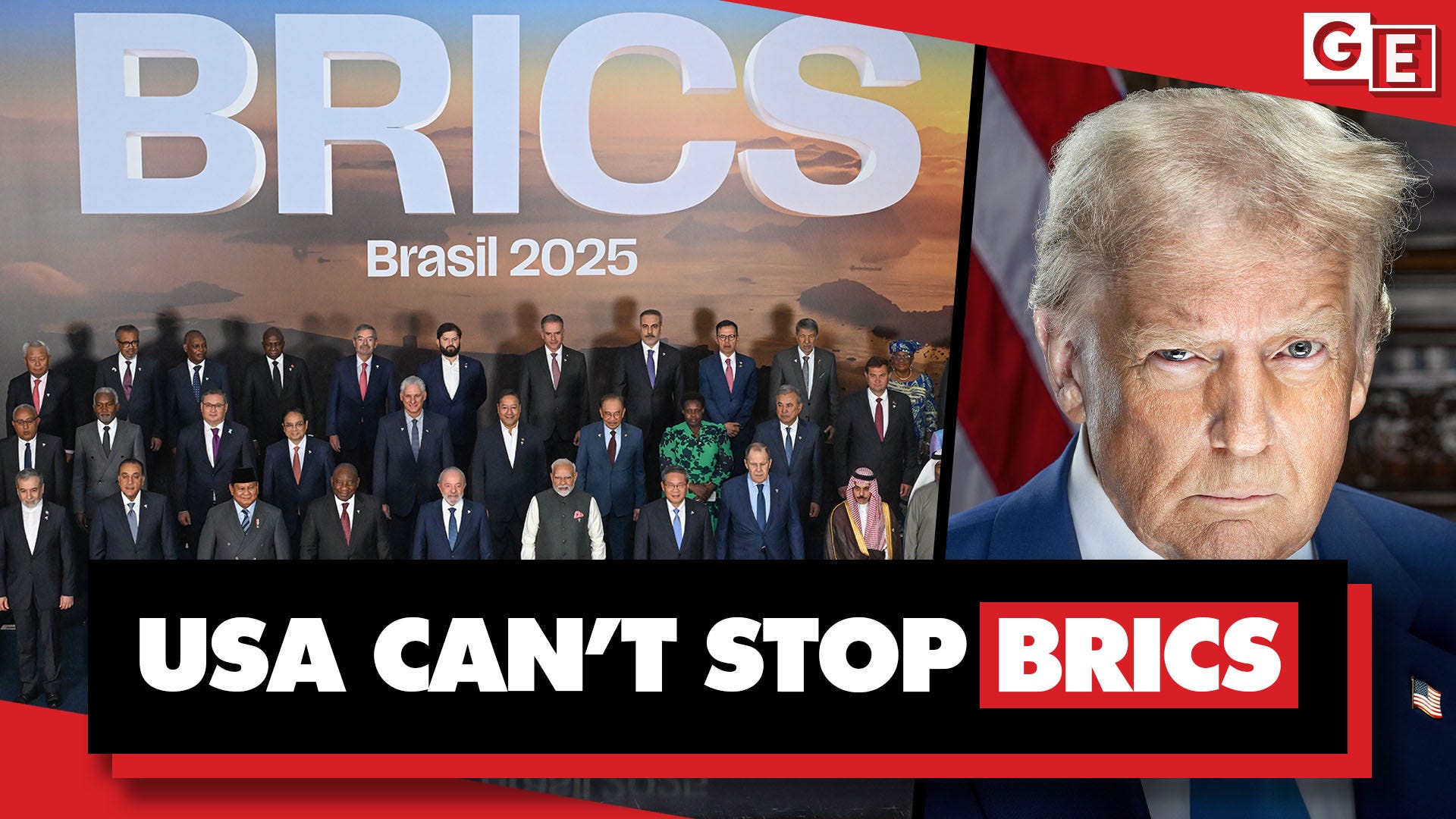
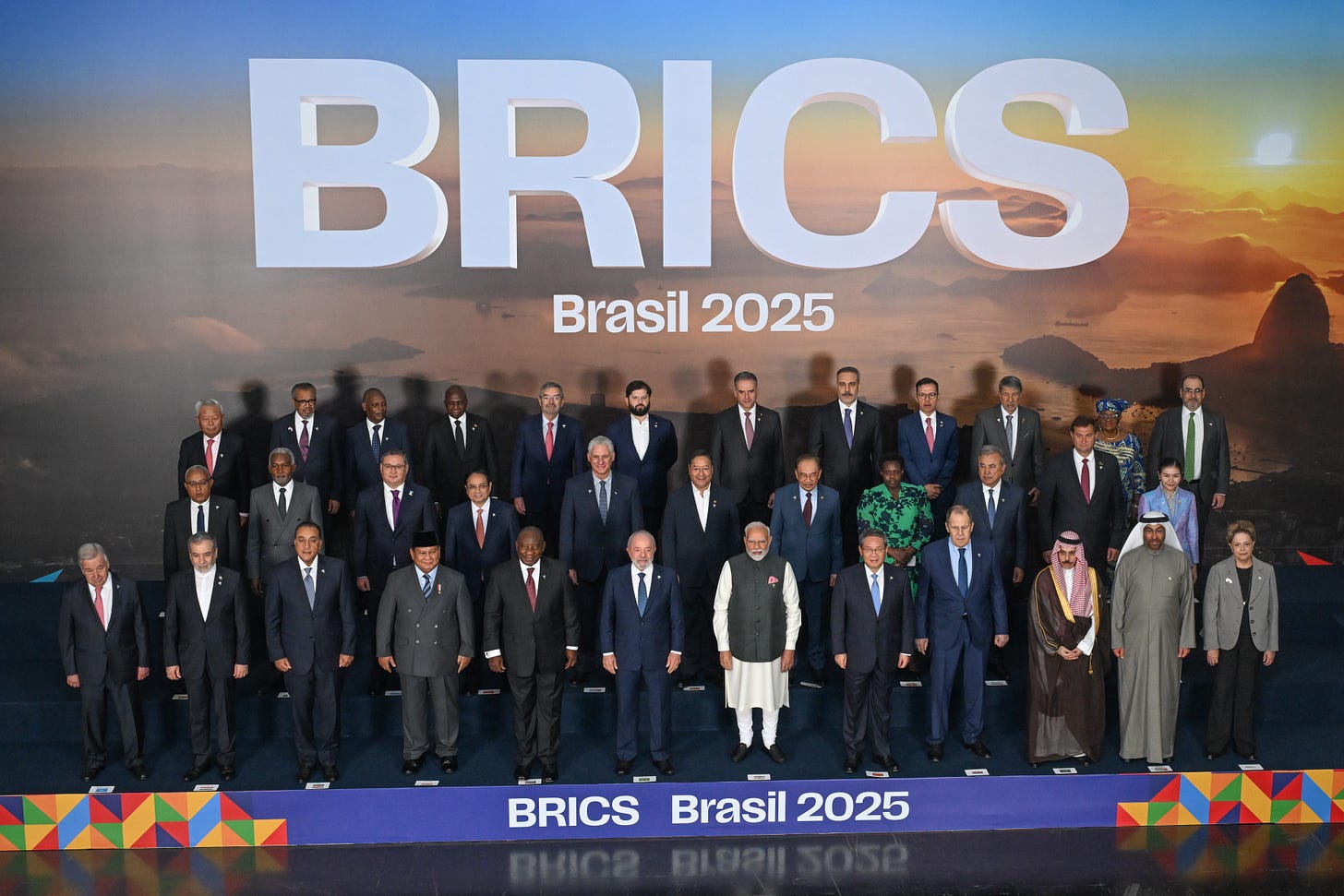
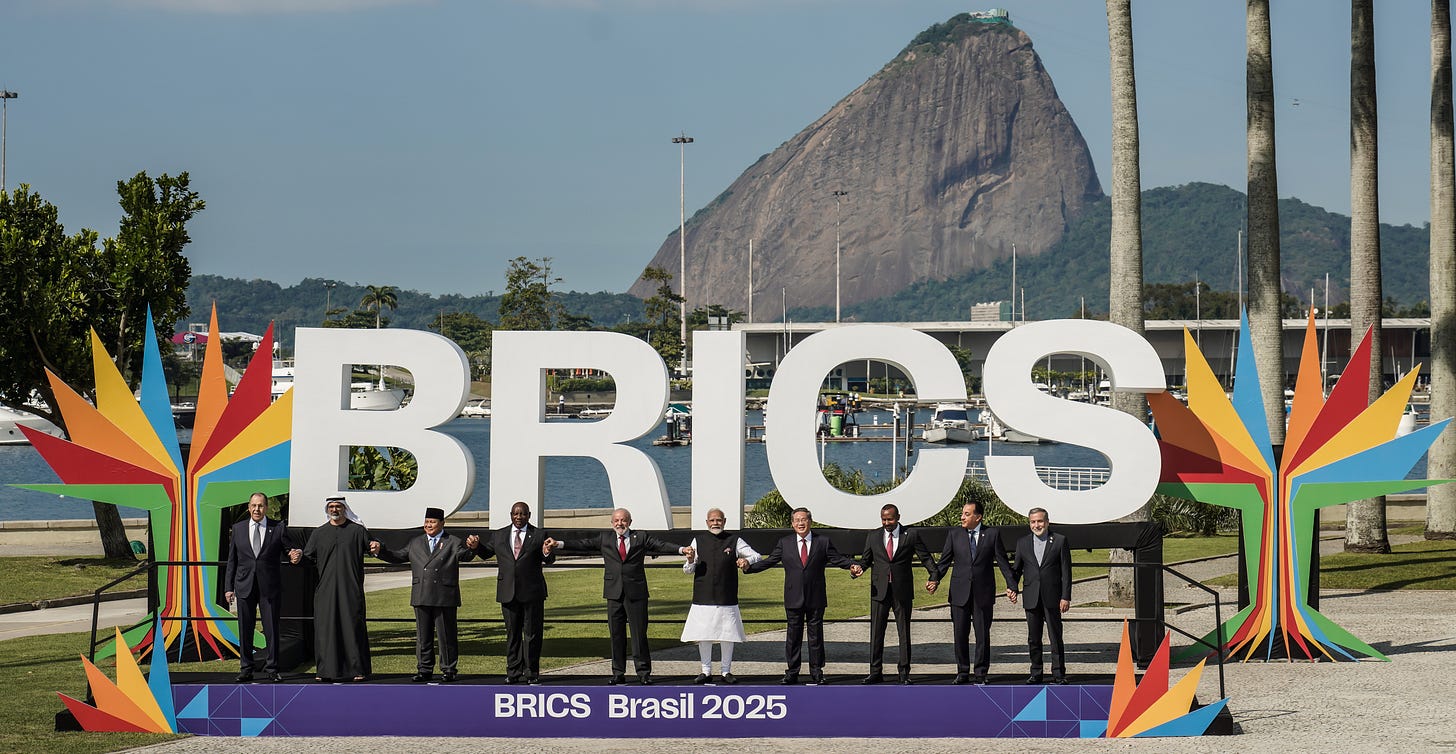
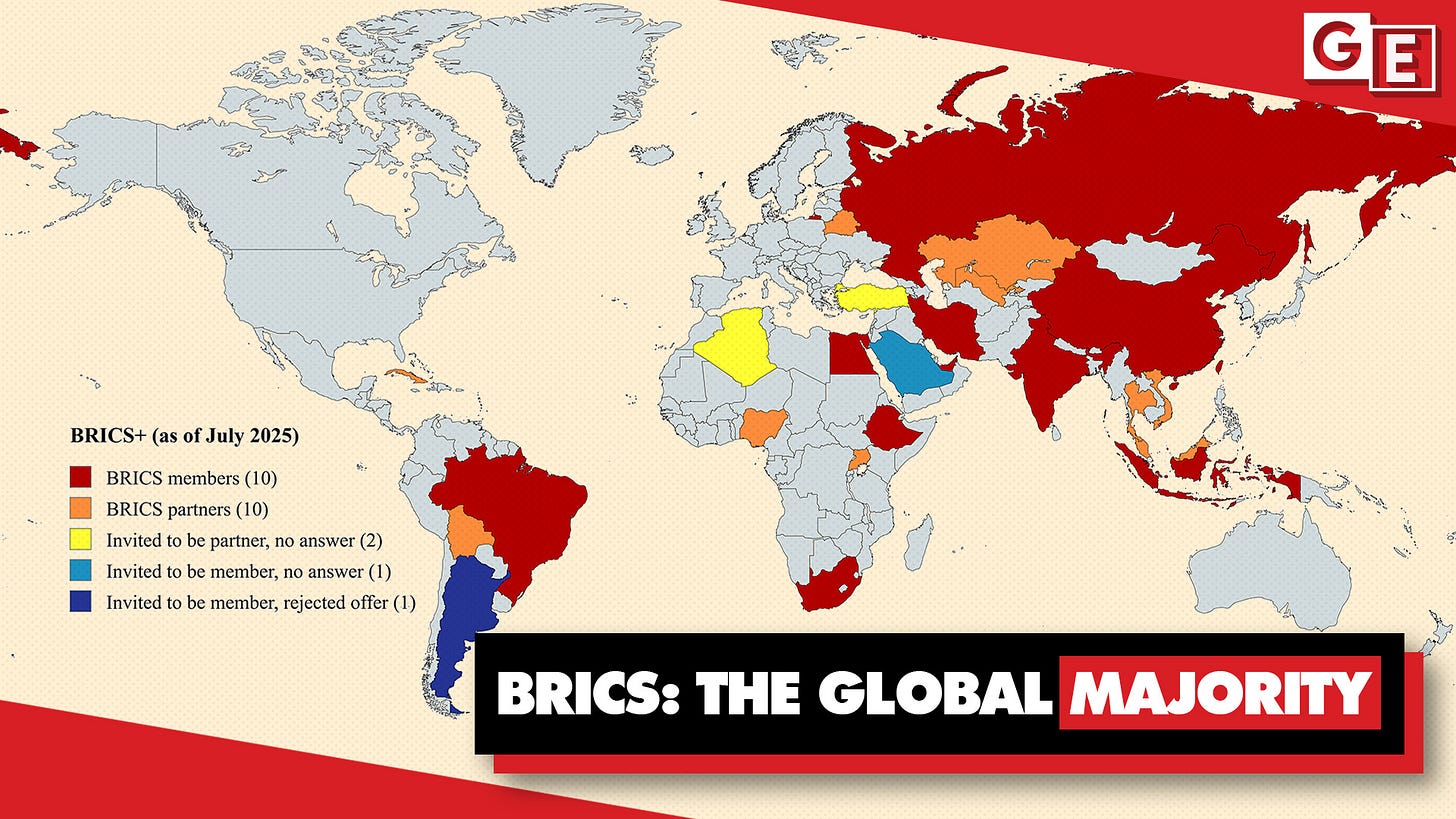
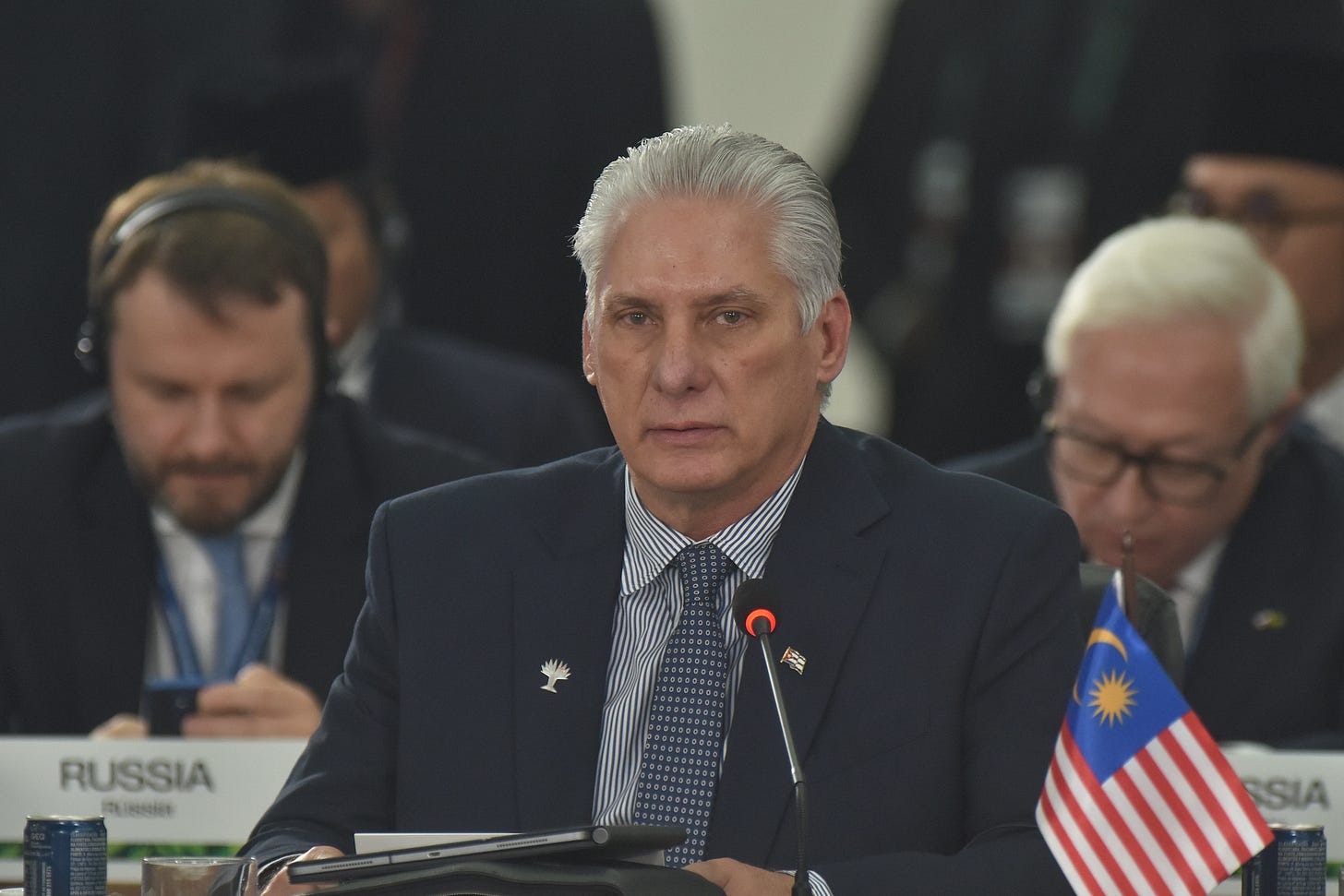
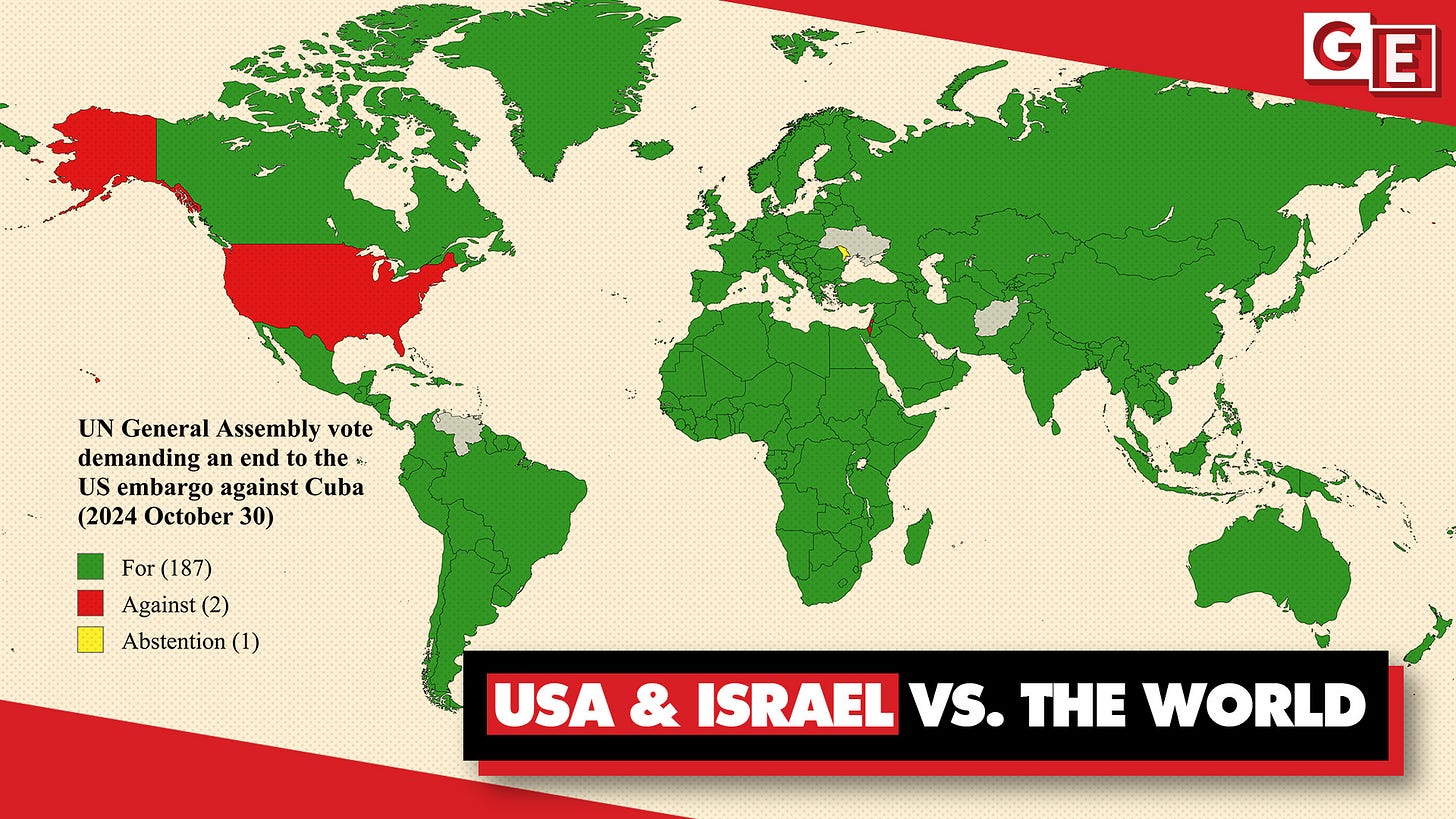




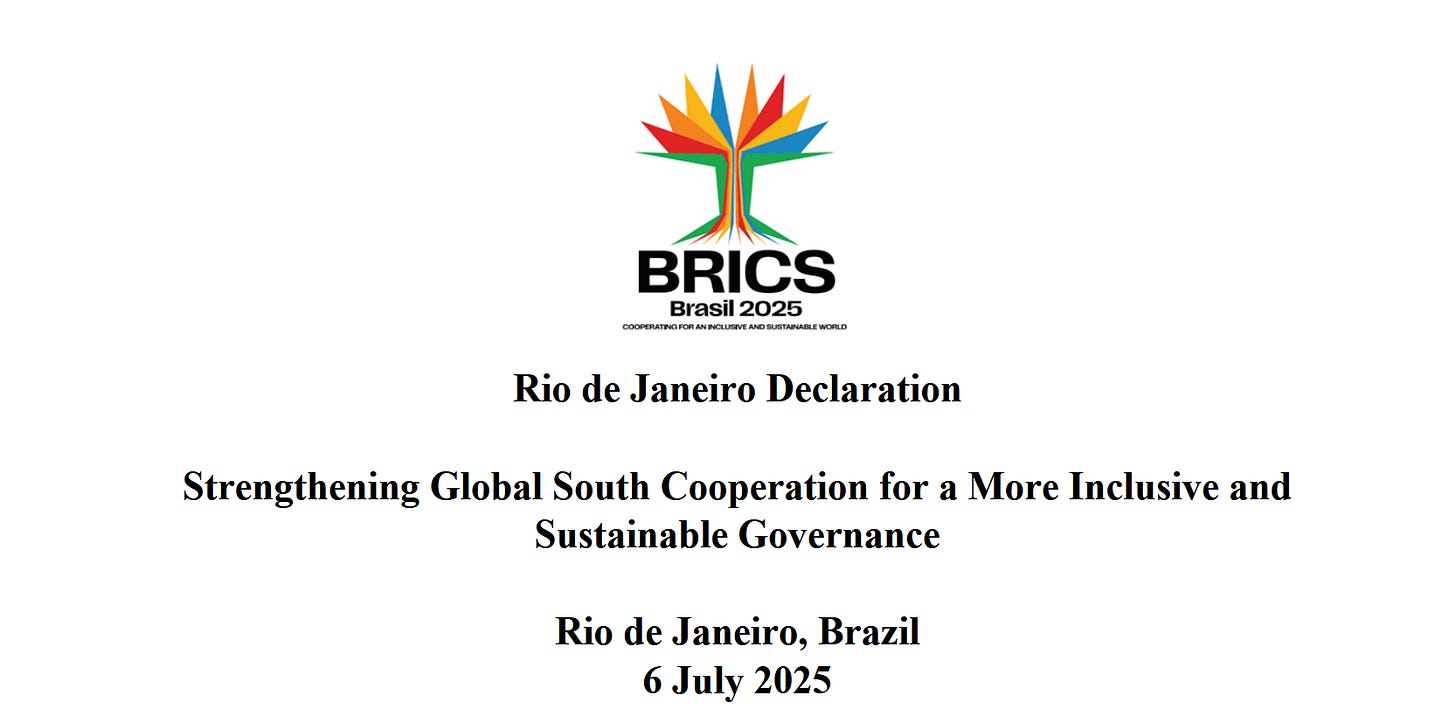

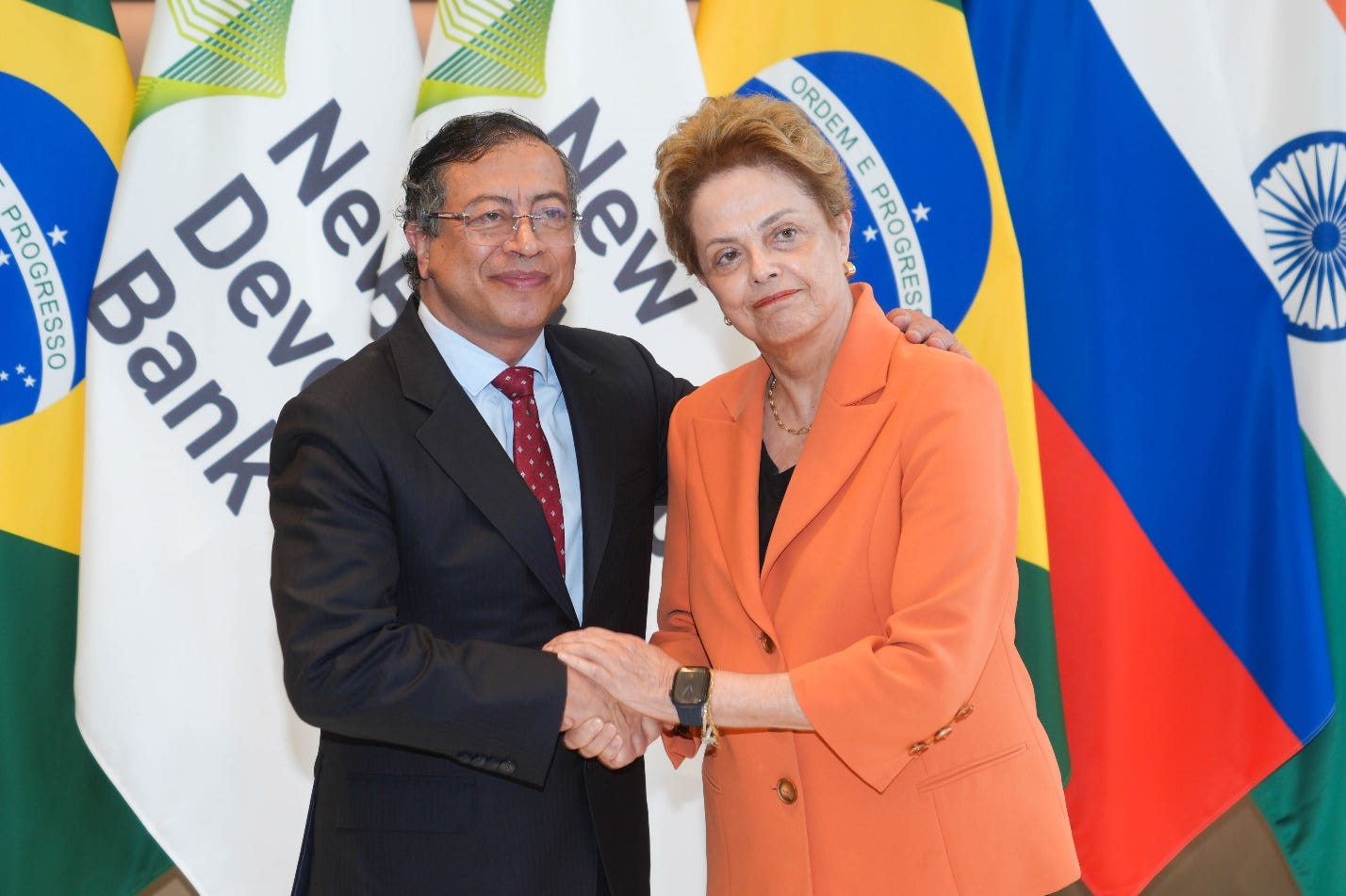


Is BRICS perfect? No, but they are making incremental steps, not in a straight line but zigging and zagging, towards an economic network free from the shackles of AngloEuroZionist neocolonial parasitism.
Trump constantly brags about ending the BRICS, but everything he does backfires worse on himself. TACO!!!
He bombastically bloviates as though he is some sort of virile turgid rooster, but in reality he is just an impotent flaccid cock.
In former Secretary of State REx Tillerson's words, Trump is just showing "What a fucking moron," he is. The UN is becoming irrelevant primarily because of the US abuse of its veto power; whereas, the powerful and influence of BRICS+ is growing and will continue to grow. We will no when the multipolar world has taken over when the dolar is dethroned.